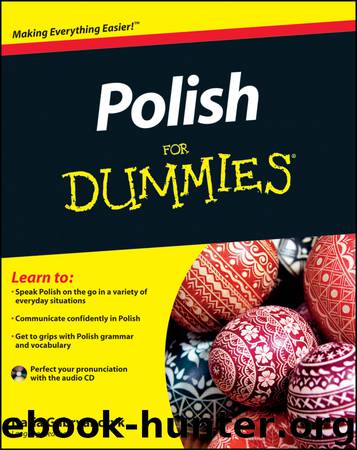Polish For Dummies by Daria Gabryanczyk

Author:Daria Gabryanczyk
Language: eng
Format: epub
Publisher: John Wiley & Sons, Ltd.
Published: 2012-02-29T16:00:00+00:00
Part III
Polish on the Go
In this part . . .
I give you the tools you need to take your Polish on the road, whether you’re going to a Polish restaurant or a museum in the capital. These chapters cover all aspects of travel from tips on how to get through the customs process, check into hotels, nab a cab, exchange your currency, ask for directions and even get help in case of emergency.
Chapter 10
Money, Money, Money
In This Chapter
Paying by card or cash
Withdrawing money from cash machines
Working out currency exchanges
According to the Polish saying, Pieniądze szczęścia nie dają (pye-n’yon-dze shchehN-sh’ch’ya n’ye da-yohN), money can’t buy you happiness. However, without money you wouldn’t be able to afford the holiday you’ve waited all year for, or get the newest gadget you crave or that pair of shoes you’ve dreamed of wearing! The reason you get up and go to work every day is because you love your job, naturally! But it’s also (and you must agree!) for the money that provides all the things that make you smile. Since Czas to pieniądz (chas to pye-n’yondz) (Time is money), it’s time to get to the money business.
Cashing In with Some Basic Info about Money
Wherever you’re going, it’s always a good thing to have some cash in the form of banknoty (ban-kno-tih) (notes) and monety (mo-ne-tih) (coins) on you, along with some basic cash-related expressions:
Masz pieniądze? (mash pye-n’yon-dze) (Do you have any money?) – informal
Nie mam przy sobie pieniędzy (n’ye mam pshih so-bye pye-n’yen-dzih) (I’ve got no money on me)
Mamy wystarczająco dużo pieniędzy (ma-mih vih-star-cha-yon-tso doo-zho pye-n’yen-dzih) (We’ve got enough money)
Nie mam drobnych (n’ye mam drob-nihh) (I have no small change)
Czy może mi pan/pani rozmienić 100 złotych? (chih mo-zhe mee pan/pa-n’ee ro-zmye-n’eech’ sto zwo-tihh) (Can you change 100 PLN for me, please?) – speaking to a man/woman
Jaka cena?/Ile to kosztuje? (ya-ka tse-na/ee-le to kosh-too-ye) (What’s the price/How much is it?)
Mamy złotówki (ma-mih zwo-toof-kee) (We have Polish currency)
Płacę gotówką/kartą (pwa-tse go-toof-kohN/kar-tohN) (I’m paying by cash/card)
When travelling in Poland, always make sure you have some cash on you –preferably in small notes, niskie nominały (n’ee-skye no-mee-na-wih). Giving you change, drobne (drob-ne), could be a problem for vendors, especially early in the day. Forget being able to get some chewing gum with a 100-złotych note! You’ll hear: Drobne, proszę! (drob-ne pro-she) (Small change, please!) or Nie mam wydać (n’ye mam wih-dach’) (I have no change).
If you live in an area where using a credit card (or any payment card, for that matter) is so easy and comfortable that you can hide your wallet full of cash deep down in a drawer and still be able to get whatever you want, be prepared for money-culture shock when you visit Poland. Despite a growing number of restaurants and shops that take most credit and debit cards, paying cash is still very common and may be the only payment option, especially in the markets or smaller shops.
Download
This site does not store any files on its server. We only index and link to content provided by other sites. Please contact the content providers to delete copyright contents if any and email us, we'll remove relevant links or contents immediately.
Housekeeping by Marilynne Robinson(3443)
The Poetry of Pablo Neruda by Pablo Neruda(3387)
Papillon (English) by Henri Charrière(3293)
World without end by Ken Follett(3022)
TCP IP by Todd Lammle(2658)
Fluent Forever: How to Learn Any Language Fast and Never Forget It by Gabriel Wyner(2468)
The Rape Of Nanking by Iris Chang(2335)
The Alchemist by Paulo Coelho(2316)
How Proust Can Change Your Life by Alain De Botton(2277)
The Partner by John Grisham(1998)
Two lives by Helen Naylor(1958)
Hitler by Ian Kershaw(1765)
Yerma by Federico García Lorca(1652)
Smilla's Sense of Snow by Peter Hoeg(1624)
Merriam-Webster's Pocket Dictionary by Merriam-Webster(1575)
Sophie's World by Jostein Gaarder(1563)
Il cavaliere inesistente by Italo Calvino(1562)
Deep Writing by Eric Maisel(1535)
Twilight of Idols and Anti-Christ by Friedrich Nietzsche(1504)
